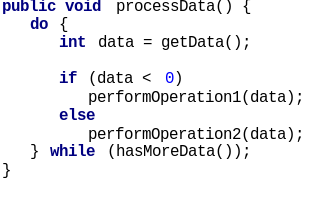Relationship to Java
Because Java and Pnuts share the same type system, Java code can easily invoke or define Pnuts functions. Likewise, Pnuts code can easily manipulate Java objects. Pnuts code can even define Java classes. Because Pnuts compiles to Java byte codes, these classes can be used by Java just like any other class. A class written in Pnuts can even later be replaced by a class written in Java with no other code changes.
Pnuts syntax can look very similar to Java. The following is a code sample written in Java that is also a valid Pnuts script:
importjava.util.ArrayList;importjava.util.List;List<String>countries=newArrayList<String>();countries.add("Canada");countries.add("Austria");countries.add("Brazil");Collections.sort(countries);for(Stringcountry:countries)System.out.println("Hello "+country);Alternatively, the expressiveness of Pnuts could be utilized:
use("pnuts.lib")// Standard module that makes sort, println and other functions available. countries=["Canada","Austria","Brazil"]sort(countries)for(country:countries)println("Hello "+country)
Dylan is a multi-paradigm programming language that includes support for functional and object-oriented programming (OOP), and is dynamic and reflective while providing a programming model designed to support generating efficient machine code, including fine-grained control over dynamic and static behaviors. It was created in the early 1990s by a group led by Apple Computer.
OCaml is a general-purpose, multi-paradigm programming language which extends the Caml dialect of ML with object-oriented features. OCaml was created in 1996 by Xavier Leroy, Jérôme Vouillon, Damien Doligez, Didier Rémy, Ascánder Suárez, and others.
In object-oriented programming, the iterator pattern is a design pattern in which an iterator is used to traverse a container and access the container's elements. The iterator pattern decouples algorithms from containers; in some cases, algorithms are necessarily container-specific and thus cannot be decoupled.

D, also known as Dlang, is a multi-paradigm system programming language created by Walter Bright at Digital Mars and released in 2001. Andrei Alexandrescu joined the design and development effort in 2007. Though it originated as a re-engineering of C++, D is a distinct language. It has redesigned some core C++ features, while also sharing characteristics of other languages, notably Java, Python, Ruby, C#, and Eiffel.

Apache Groovy is a Java-syntax-compatible object-oriented programming language for the Java platform. It is both a static and dynamic language with features similar to those of Python, Ruby, and Smalltalk. It can be used as both a programming language and a scripting language for the Java Platform, is compiled to Java virtual machine (JVM) bytecode, and interoperates seamlessly with other Java code and libraries. Groovy uses a curly-bracket syntax similar to Java's. Groovy supports closures, multiline strings, and expressions embedded in strings. Much of Groovy's power lies in its AST transformations, triggered through annotations.

ActionScript is an object-oriented programming language originally developed by Macromedia Inc.. It is influenced by HyperTalk, the scripting language for HyperCard. It is now an implementation of ECMAScript, though it originally arose as a sibling, both being influenced by HyperTalk.

The syntax of the Java refers to the set of rules defining how a Java program is written and interpreted.
In computer programming, an entry point is where the first instructions of a program are executed, and where the program has access to command line arguments.

Scala is a general-purpose programming language providing support for functional programming and a strong static type system. Designed to be concise, many of Scala's design decisions aimed to address criticisms of Java.
In the Java computer programming language, an annotation is a form of syntactic metadata that can be added to Java source code. Classes, methods, variables, parameters and Java packages may be annotated. Like Javadoc tags, Java annotations can be read from source files. Unlike Javadoc tags, Java annotations can also be embedded in and read from Java class files generated by the Java compiler. This allows annotations to be retained by the Java virtual machine at run-time and read via reflection. It is possible to create meta-annotations out of the existing ones in Java.
Generics are a facility of generic programming that were added to the Java programming language in 2004 within version J2SE 5.0. They were designed to extend Java's type system to allow "a type or method to operate on objects of various types while providing compile-time type safety". The aspect compile-time type safety was not fully achieved, since it was shown in 2016 that it is not guaranteed in all cases.
In computer programming, a local variable that is assigned a value but is not read by any subsequent instruction is referred to as a dead store. Dead stores waste processor time and memory, and may be detected through the use of static program analysis, and removed by an optimizing compiler.
MVFLEX Expression Language (MVEL) is a hybrid dynamic/statically typed, embeddable Expression Language and runtime for the Java Platform. Originally started as a utility language for an application framework, the project is now developed completely independently.
Static import is a feature introduced in the Java programming language that allows members which have been scoped within their container class as public static, to be used in Java code without specifying the class in which the field has been defined. This feature was introduced into the language in version 5.0.
OptimJ is an extension of the Java with language support for writing optimization models and abstractions for bulk data processing. The extensions and the proprietary product implementing the extensions were developed by Ateji which went out of business in September 2011. OptimJ aims at providing a clear and concise algebraic notation for optimization modeling, removing compatibility barriers between optimization modeling and application programming tools, and bringing software engineering techniques such as object-orientation and modern IDE support to optimization experts.
In software engineering, the module pattern is a design pattern used to implement the concept of software modules, defined by modular programming, in a programming language with incomplete direct support for the concept.
Xtend is a general-purpose high-level programming language for the Java Virtual Machine. Syntactically and semantically Xtend has its roots in the Java programming language but focuses on a more concise syntax and some additional functionality such as type inference, extension methods, and operator overloading. Being primarily an object-oriented language, it also integrates features known from functional programming, e.g. lambda expressions. Xtend is statically typed and uses Java's type system without modifications. It is compiled to Java code and thereby seamlessly integrates with all existing Java libraries.

Elm is a domain-specific programming language for declaratively creating web browser-based graphical user interfaces. Elm is purely functional, and is developed with emphasis on usability, performance, and robustness. It advertises "no runtime exceptions in practice", made possible by the Elm compiler's static type checking.

Kotlin is a cross-platform, statically typed, general-purpose programming language with type inference. Kotlin is designed to interoperate fully with Java, and the JVM version of its standard library depends on the Java Class Library, but type inference allows its syntax to be more concise. Kotlin mainly targets the JVM, but also compiles to JavaScript or native code. Language development costs are borne by JetBrains, while the Kotlin Foundation protects the Kotlin trademark.

Nim is an imperative, general-purpose, multi-paradigm, statically typed, systems, compiled programming language designed and developed by Andreas Rumpf. It is designed to be "efficient, expressive, and elegant", supporting metaprogramming, functional, message passing, procedural, and object-oriented programming styles by providing several features such as compile time code generation, algebraic data types, a foreign function interface (FFI) with C and C++, and compiling to C, C++, Objective-C, and JavaScript.








